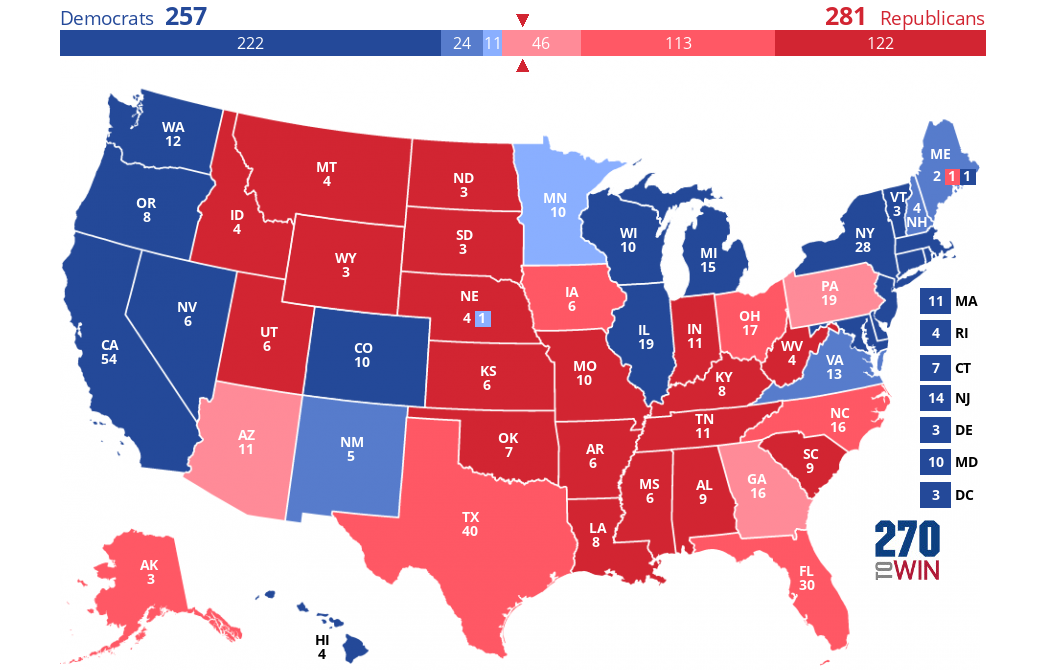We support our Publishers and Content Creators. You can view this story on their website by CLICKING HERE.
Thus far, we’ve avoided focusing on single polls in the presidential election. Having been burned by that approach in the past, we have instead watched trends across aggregated poll data to ensure we don’t get ahead of our skis.
Advertisement
The Quinnipiac poll released late yesterday justifies an exception. First, we’re coming down to final iterations in the closing days of the campaign, where pollsters presumably will do their best to ensure accuracy compared to the election outcomes. And second, this is the first time Quinnipiac has shown Donald Trump with a lead — any lead — in Pennsylvania (hat tip to A.W. Guerra in Thursday’s Wednesday’s Final Word):
Trump receives 47 percent support among likely voters, Harris receives 46 percent support, Green Party candidate Jill Stein receives 2 percent support, and Libertarian Party candidate Chase Oliver receives 1 percent support. Two percent of likely voters refused to respond and 1 percent are undecided. This is the closest this multi-candidate race has been in Pennsylvania.
In Quinnipiac University’s October 9 poll, Harris received 49 percent support, Trump received 46 percent support, and Stein and Oliver each received 1 percent support in a race that was too close to call.
Quinnipiac has surveyed Pennsylvania four times in less than three months. In mid-September, they had Harris up five and over the majority mark, 51/46. Three weeks ago, as their memo attests, Harris still led by two. This trend matches up with the RCP aggregation trend in PA as well; Harris peaked at +1.0 in mid-September, shortly after her debate with Trump, but has been sliding ever since, both in comparison to Trump and in level of support. On September 20, Harris had a 48.5% average in RCP’s aggregation, but exactly one month later it dropped to 47.1 before coming back up to 47.6% in today’s average.
Advertisement
What changed in PA for Quinnipiac? The gender gap, and this is particularly worrisome for Democrats in other races:
Men back Trump 57 – 37 percent, while women back Harris 55 – 39 percent. In Quinnipiac University’s October 9 poll, men backed Trump 52 – 41 percent, while women backed Harris 55 – 40 percent.
Trump went from a +11 with men to a +20, while the split among women remained pretty much static. What changed in those three weeks? For one thing, Trump sat with Joe Rogan for three hours, while Harris hung out with Beyoncé. For another, the Obamas and Hillary Clinton showed up to harangue men about their misogyny and racism for not being enthusiastic about Kamala Harris. One has to wonder where men in PA are now after Joe Biden’s “garbage” comment too, and Trump’s response to it.
Another worrisome trend for Democrats in the presidential race: the black vote. In my previous post, I looked at Politico’s warning in North Carolina about turnout and draw in this demo, but the same appears true in PA. According to the Q-poll internals, Trump gets 15% of the black vote while Harris only gets 72%, with 5% going to Jill Stein and the rest undecided. In a head–to-head matchup, Trump gets 16% of the black vote while Harris only gets 77%. Four years ago, Biden won PA by 1.2% while winning this demo 92/7, just as in North Carolina. If Trump gets 15% of the black vote in PA, then Harris is in deep trouble, especially with the gender gap where Quinnipiac puts it.
Advertisement
There’s more in this poll that should worry Democrats too. Along with shift came another in the Senate race. Dave McCormick picked up five points in the gap over the last three weeks and is now within the margin of error against incumbent Senate Democrat Bob Casey, 47/50. Three weeks ago, Quinnipiac polled this at 43/51. The shift in both races indicates that the GOP has picked up momentum in PA as the election nears and voters engage in early voting, and that’s a very bad trend for Democrats.
PA appears to be slipping away from Democrats. Where would that leave the race? Let’s chart this out with 270toWin based on a map where Democrats hold Wisconsin and Michigan but lose PA and NC, as well as Georgia and Arizona, where RCP polling aggregation shows Trump with significant leads.
That doesn’t include Nevada, where the polls and early voting data point to a Republican upset. RCP aggregation has Michigan and Wisconsin slightly in Harris’ column at the moment, thanks to some late polling from CNN in WI especially, but Trump could still be poised for wins there. If the trends in PA and NC hold up, though, it may not matter.
Addendum: Elon Musk seems encouraged by the early-voter data too, as of close of business Tuesday:
The 2024 Pennsylvania Republican vs Democrat vote is now over 500k better than the same day in 2020, when Biden’s victory margin was only 80k!
Moreover, yesterday there were more Republican early votes than Democrat.
Pennsylvania will be a decisive Republican victory. pic.twitter.com/MQyvjc1exf
— Elon Musk (@elonmusk) October 30, 2024
Advertisement
Democrats still lead, but their totals are 430,000 lower than at the same time four years ago. The GOP has cast about 90,000 more ballots than at this time four years ago. Instead of an EV lead of 920K in 2020, Democrats now have an EV lead of ~400K. That may be huge in terms of GOTV effectiveness and enthusiasm, but it’s still a 400K ballot lead for Dems at the moment, too. Let’s not get too excited just yet.

 Conservative
Conservative  Search
Search Trending
Trending Current News
Current News 







